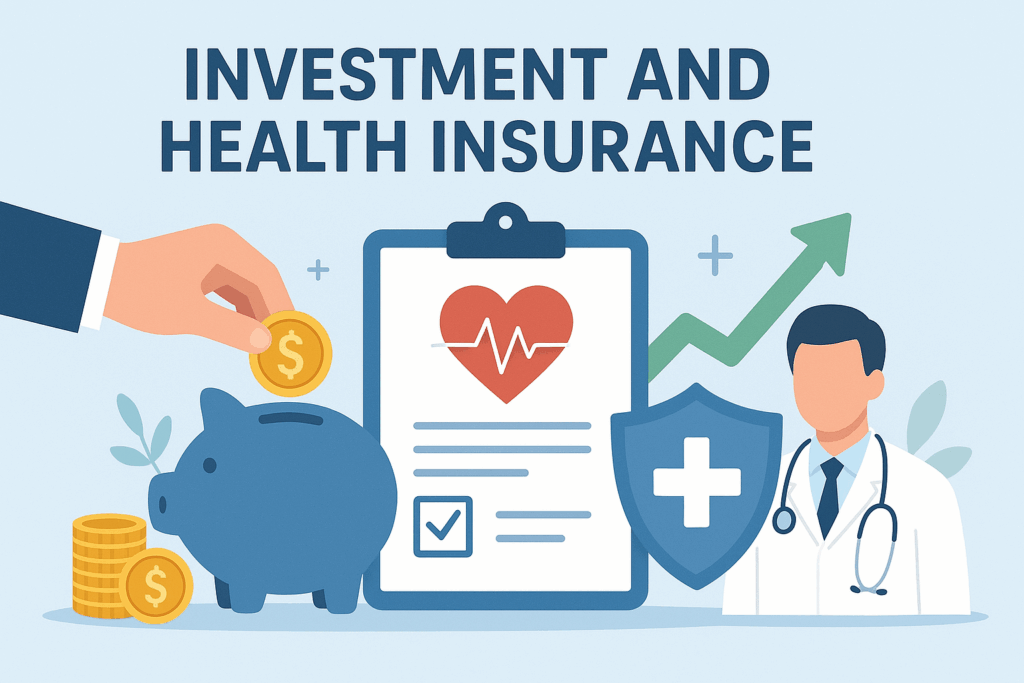Investment and Health Insurance: A Smart Guide to Financial Security
When it comes to financial planning, two terms stand out—investment and health insurance. Most people see them as separate decisions, but the truth is they go hand in hand. Investment helps your money grow, while health insurance protects that wealth from being wiped out by unexpected medical expenses.
In this blog, let’s explore how investment and health insurance are connected, why they are equally important, and how you can balance both for a safe and secure financial future.
Why Health Insurance Is a Must
Medical emergencies never come with a warning. One hospital visit can burn a hole in your savings. That’s why health insurance is the first shield of financial protection.Key reasons you need health insurance:
- ✅ Rising medical costs: Hospital bills are increasing at double the pace of normal inflation.
- ✅ Lifestyle diseases: Issues like diabetes, hypertension, and heart disease are striking earlier than before.
- ✅ Peace of mind: Knowing that your family’s medical expenses are covered reduces financial stress.
- ✅ Tax benefits: Premiums paid on health insurance qualify for deductions under Section 80D of the Income Tax Act in India.
👉 Without health insurance, one illness could force you to liquidate your investments.
Why Investment Is Equally Important
While health insurance protects, investment helps you grow financially. If you rely only on insurance without building wealth, you may struggle to meet long-term goals.
Benefits of investment:
- 💹 Beats inflation: Investments in equity, mutual funds, or bonds grow faster than inflation.
- 🎯 Achieves life goals: Education, home purchase, retirement—investments fund these milestones.
- 💼 Acts as a backup: Even with health insurance, some expenses (like travel, special treatments) aren’t covered. Investments bridge this gap.
- 🌱 Wealth creation: Compounding over years helps you build financial freedom.
The Perfect Balance Between Investment and Health Insurance
The smartest approach is not choosing one over the other but combining both. Here’s how you can balance them:
- Start with Health Insurance First
- Take individual or family floater plans with adequate coverage.
- Aim for at least ₹10–20 lakhs of coverage in today’s times.
- Build an Emergency Fund
- Keep 3–6 months of expenses aside in liquid investments.
- This acts as your first line of defense before tapping insurance.
- Invest Early and Regularly
- Begin SIPs in mutual funds to take advantage of compounding.
- Increase your investment amount as your income grows.
- Review Annually
- Upgrade your health insurance coverage as healthcare costs rise.
- Rebalance your portfolio to match your risk profile.
Best Investment Options to Complement Health Insurance
If you already have health insurance, here are smart investment options to grow your wealth:
- Mutual Funds (SIP): Regular small investments that compound into big wealth.
- Equity Stocks: High-risk, high-return investments for long-term goals.
- Fixed Deposits & Bonds: Stable but lower returns—ideal for safety.
- Retirement Plans (NPS, Pension Funds): Ensure steady income when medical needs increase in old age.
- Real Estate & Gold: Good for diversification but should not be your only investments.
How Investment and Health Insurance Work Together
Think of investment and health insurance as two pillars of financial security.
- Health insurance = Shield → Protects your wealth from medical expenses.
- Investment = Sword → Helps you grow wealth to fund life goals.
- Together = Complete Protection → You are safe from risks and prepared for the future.
Common Mistakes to Avoid
Many people make costly mistakes while planning for investment and health insurance:
- ❌ Relying only on employer-provided health insurance.
- ❌ Ignoring inflation when choosing coverage.
- ❌ Investing aggressively without first securing insurance.
- ❌ Not reviewing policies and investments yearly.
- ❌ Using savings for medical bills instead of making insurance claims.
Real-Life Example
Let’s look at two friends, Ravi and Amit:
- Ravi invests heavily in mutual funds but ignores health insurance. One sudden surgery of ₹7 lakhs forces him to sell his investments, wiping out 5 years of savings.
- Amit takes health insurance early and invests regularly. When faced with the same surgery, his insurance covers the cost while his investments keep growing undisturbed.
👉 The lesson: Health insurance protects your investments, and investments secure your future.
Tips to Maximize Both
- ✅ Take health insurance early (premiums are lower at a younger age).
- ✅ Opt for top-up or super top-up health insurance for higher coverage.
- ✅ Start investing small, but stay consistent.
- ✅ Use tax benefits wisely (Section 80C for investment, 80D for insurance).
- ✅ Don’t treat them separately—see them as part of one financial plan.
Conclusion
In today’s world, you cannot afford to choose between investment and health insurance—you need both. Health insurance protects your wealth from medical shocks, while investments help you grow financially and achieve life goals. Together, they build a strong financial foundation that keeps you secure, stress-free, and future-ready.
👉 Start by taking adequate health insurance, build your emergency fund, and then invest regularly. Over time, this balance will give you both financial security and financial freedom.
✨ Final Call-to-Action (CTA):
If you want expert guidance on balancing investment and health insurance for your family’s future, reach out to us today. Let’s build your financial security together.

